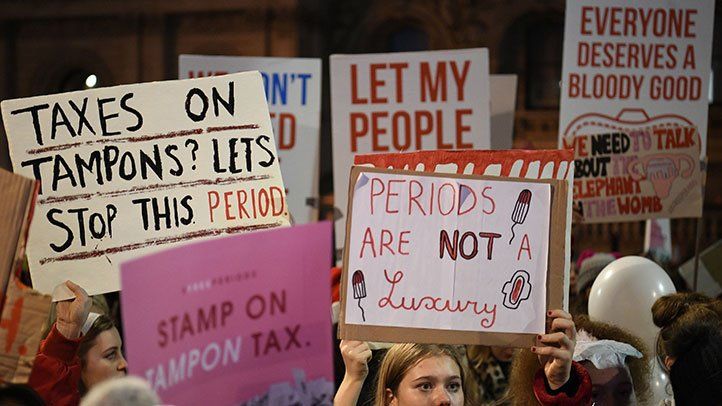Feminine Products: A Necessity, Not a Luxury
November 5, 2021
Periods are a natural process that all women go through, and yet, there is a sense of shame associated with them. Due to the stigma surrounding menstrual cycles, some people treat feminine hygiene products as luxury items. We must end period stigma, and understand that period products are necessities, not luxuries.
Menstruation is a highly stigmatized issue. Girls at Arcadia High School hide their pads and tampons in fear of being ridiculed. When a girl needs a pad, another girl may provide it, but not without purposefully sneaking it under a table so that her action is not recognized.
Not only that, but people around the world ask women if it’s “their time of the month” because it would explain their “mood swings”, right? No. That’s not right whatsoever. All that this is doing is putting down women and making them feel lesser because of a biological process that they do not have control over. Periods are natural processes that need to be more widely accepted.
Stigma about menstruation has led to a phenomenon called period poverty. Period poverty is the lack of access to sanitary products, education regarding menstruation, hygiene facilities, and waste management.
According to UNICEF, “Globally, 2.3 billion people live without basic sanitation services and in developing countries, only 27% of people have adequate hand washing facilities at home.”
A multitude of organizations supporting women have expressed their concerns and stances regarding the double standard the Pink Tax creates.
Women Who Money, a finance organization that provides financial information to women, stated that “women pay an additional $1,400 a year due to the pink tax.”
“35 U.S. states tax period products as non-essential items, whereas men’s grooming products and erectile dysfunction medication are not taxed,” the American Medical Women’s Association, an organization of women physicians and medical students that is a voice for women’s health and women in medicine, said.
Furthermore, the nonprofit American Civil Liberties Union outlined a study that revealed that almost two-thirds of low-income women were unable to afford the steep costs of menstrual hygiene products in the St. Louis area.
Anne Sebert Kuhlmann, director of the master of public health program at St. Louis University, said, “We had women tell us that they had gone to the emergency room for the sole purpose of getting a pad and the mesh postpartum underwear they provide, because they didn’t have underwear and they didn’t have period products—and they had nowhere else to go.”
In California, Governor Gavin Newsom passed a bill that requires low-income schools to provide students with free menstrual products. These schools include grades six to twelve, as well as community colleges. This bill’s requirement will begin in the 2022-2023 school year, and private schools in California are encouraged to follow suit.
“Our biology doesn’t always send an advanced warning when we’re about to start menstruating, which often means we need to stop whatever we’re doing and deal with a period,” Assemblywoman Cristina Garcia said in an article from NBC News. “Just as toilet paper and paper towels are provided in virtually every public bathroom, so should menstrual products.”
Although making period products free in public schools will not completely eradicate period poverty, it is a step in the right direction. To continue making positive changes, there should be education for children, both boys and girls, in school that would discuss information on menstrual cycles, which would help destigmatize periods. We need the world to understand that feminine products are necessities, not luxuries.
Photo Courtesy of GETTYIMAGES.COM

